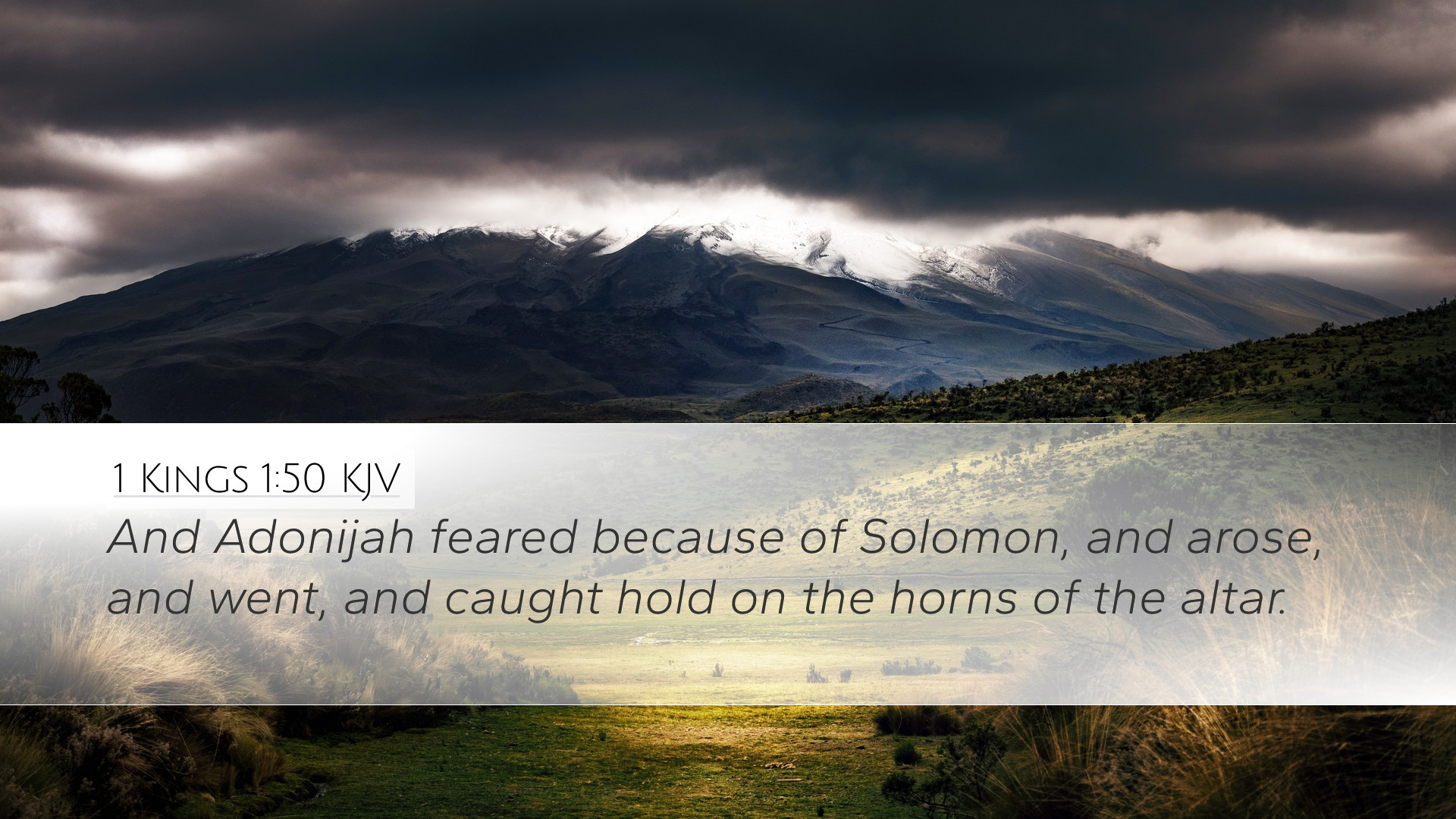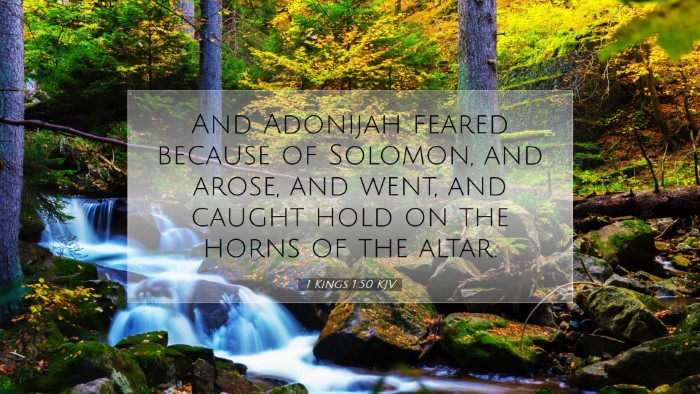Commentary on 1 Kings 1:50
Verse: "And Adonijah feared because of Solomon, and arose, and went, and caught hold on the horns of the altar."
Introduction
1 Kings 1:50 presents a pivotal moment during the transition of power in Israel. This verse depicts the fear of Adonijah as he grapples with the consequences of his attempt to usurp the throne. The symbolism of seeking refuge at the altar is significant, denoting both a physical and spiritual appeal for mercy and protection. This commentary combines insights from esteemed public domain commentaries to draw deeper understanding suitable for pastors, scholars, and students of theology.
Contextual Background
The backdrop of this passage is essential for understanding Adonijah’s actions. Following the death of King David, there was a struggle for the throne between Adonijah, the fourth son of David, and Solomon, who was chosen by David as his successor. The events leading up to 1 Kings 1 include Adonijah's attempts to secure his position, which ignited tensions and divisions among the royal family and the nation of Israel.
Exegesis of the Verse
In this verse, we see Adonijah's fear stemming from the knowledge that Solomon had solidified his claim to the throne with support from influential figures. This fear drove him to seek refuge at the altar, which was often a place of sanctuary (Exodus 21:14, 1 Kings 2:28) where one could plead for mercy.
-
Fear of Retribution: Adonijah’s fear signifies a deeper understanding of the consequences of his actions. Matthew Henry observes that his reckless ambition had led him to a place where he recognized the imminent danger due to Solomon’s rightful claim.
-
Catching Hold of the Horns: Albert Barnes elucidates that the "horns of the altar" represent a symbol of divine mercy. By grasping the horns, Adonijah was appealing to God for clemency in the face of his treachery.
Theological Implications
The decision to flee to the altar reflects entrenched theological themes of grace and judgment. Adonijah’s actions towards Solomon and his own brothers displayed a stark contrast to the humility that is often required for true leadership in God’s kingdom.
-
Grace in the Midst of Judgment: Adam Clarke remarks on the contrast between God’s mercy and human folly. Despite Adonijah’s serious missteps, he still had the option to appeal for grace, which is a profound truth in theological study.
-
Repentance and Restoration: This moment can also serve as a significant teaching point for pastors, accentuating the importance of true repentance. Refuging at the altar was a step toward acknowledging his wrongdoings, albeit rooted in self-preservation.
Application for Today
For contemporary readers, this verse encourages reflection on the nature of power and human ambition. The desire for control can lead individuals to disregard righteousness. The act of seeking refuge at the altar serves as an applicable metaphor for believers today, urging them to seek God’s presence when faced with fear and uncertainty.
Lessons for Pastors and Church Leaders
- The Importance of Humility: Leaders should strive for a humble heart and recognize the sovereignty of God in all matters of leadership.
- Understanding the Weight of Influence: Like Adonijah, it is essential to be aware of the impact of our choices on the community and to guide others with integrity.
Insights for Students and Theologians
- Exploration of Symbolism: The horns of the altar can be researched further to understand its significance in the context of ancient Israelite worship.
- Study of Kingship in Israel: This passage invites scholarly examinations into Israel’s political structure and divine appointment of leaders, which resonates through biblical history.
Conclusion
1 Kings 1:50 is a rich verse that encapsulates themes of fear, mercy, ambition, and the quest for redemption. Adonijah's actions reflect the complexities of human nature, showcasing that even in moments of grave uncertainty, there lies an opportunity for repentance and seeking divine mercy. This commentary draws on timeless insights from early biblical scholars and provides a platform for further reflection and study among pastors, students, and theologians alike.


